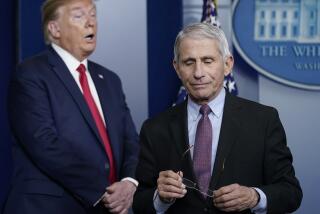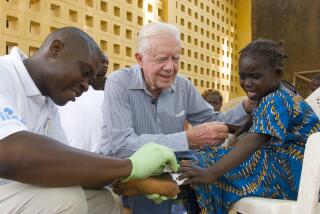President Visits AIDS Patients in U.S. Clinic : Health: Bush urges compassion for victims of the disease. Researchers are called heroes.
- Share via
WASHINGTON — President Bush, striving to keep a normal schedule amid the Panama crisis, met with AIDS patients at a National Institutes of Health clinic Friday and characterized as “heroes” the biomedical researchers who are easing their suffering.
Bush called for compassion and understanding for AIDS patients, but he warned that many Americans still “don’t want to help, don’t want to become involved, because of a misplaced fear.”
He said that more education is needed, noting that many Americans are “afraid of holding an AIDS patient because they’re afraid of getting AIDS. Barbara and I want to say--and we hope we can continue to demonstrate this--they are wrong.”
AIDS is transmitted primarily through sexual contact and the sharing of hypodermic needles by drug addicts. It can also be transmitted through contaminated blood products and can be passed by an infected mother to her unborn infant.
Bush likened AIDS researchers to the young soldiers fighting in Panama. In both cases, individuals are “giving the greatest gift imaginable, the gift of life.”
The President cited efforts in clinical pathology, diagnostic radiology, nuclear medicine and laboratory science, saying that such research has resulted in significant advances.
He said that the reported success of an AIDS-related vaccine in animals and the use of the drug AZT to treat AIDS patients are advances that stem from basic biomedical research supported by the National Institutes of Health.
At the national institutes’ clinic in Bethesda, Md., Bush met with two groups of AIDS patients: one composed of adult victims and one of infected children who were accompanied by their parents.
One of the children, 9-year-old Brent Lykins, dressed in a blue suit and pink bow tie, told the President: “I hope everyone will be cured.”
Bush replied to the small blond child: “I believe it will happen.”
He gave the children small boxes of candy.
The fact that Bush met at the Bethesda clinic with gay men suffering from AIDS was hailed by the National Gay and Lesbian Task Force as the first time that the Administration had openly acknowledged that AIDS “has a particular impact on the gay community and gay people.”
“We hope the President will go beyond a photo opportunity to provide genuine presidential leadership,” said Sue Hyde, a task force spokeswoman. “It’s about time, eight years into the epidemic. There’s not a moment to lose.”
Hyde called on Bush to push for approval of the Americans with Disabilities Act, which she described as a “civil rights act for people with all sorts of disabilities,” including AIDS. In addition, she urged Bush to support funding for an educational campaign on how to prevent transmission of AIDS and for a national health care plan.
As of November, 115,158 AIDS cases had been reported to the federal Centers for Disease Control, the White House said. Among them, White House Press Secretary Marlin Fitzwater said, were 1,947 children under 13 years old. Of the total reported cases, 68,441 individuals, including 1,059 children, have died.
Fitzwater said that, based on current projections, about 1 million people in the United States are infected with the HIV virus and that available data suggests that, by 1992, the cumulative number of diagnosed AIDS cases will be 365,000, with nearly 263,000 deaths.
He said that the federal government had committed $2.25 billion in the last fiscal year to fight AIDS.
Bush, who toured the national institutes’ center shortly before leaving Washington for the holidays, has maintained an active schedule this week despite the conflict between U.S. troops and supporters of Panamanian strongman Manuel A. Noriega.
Bush’s strategy contrasts pointedly with that of former President Jimmy Carter, who canceled many trips and functions during the Iran hostage crisis. Carter, perceived by many to be overly preoccupied with the crisis, suffered political damage as a result.
“Given the events of the last few days, I know that you have a lot on your mind,” Louis W. Sullivan, secretary of health and human services, told the President. “That is why we are very grateful and extremely honored by your visit here today.”
Sullivan said that Bush’s visit to the facility “underlines your unwavering national commitment to biomedical research and to the members of our scientific community on this campus and around the nation.”
Staff writer James Gerstenzang contributed to this story.
More to Read
Sign up for Essential California
The most important California stories and recommendations in your inbox every morning.
You may occasionally receive promotional content from the Los Angeles Times.













